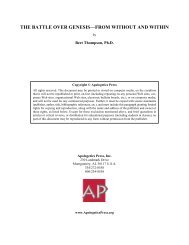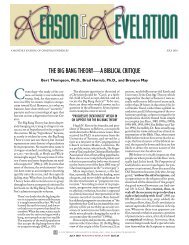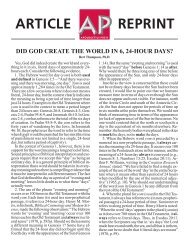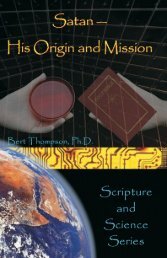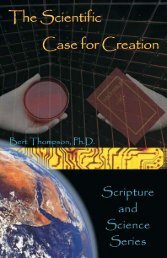The Many Faces, and Causes, of Unbelief - Apologetics Press
The Many Faces, and Causes, of Unbelief - Apologetics Press
The Many Faces, and Causes, of Unbelief - Apologetics Press
Create successful ePaper yourself
Turn your PDF publications into a flip-book with our unique Google optimized e-Paper software.
enjoyable experience to be exposed to the slings <strong>and</strong> barbs <strong>of</strong><br />
infidelity. Nor is it pleasant to be labeled as dumb, stupid, or<br />
ignorant because you hold to a belief different than your opponent’s.<br />
Yet it is those very labels that have been applied to<br />
those <strong>of</strong> us who are willing to defend the existence <strong>of</strong> God or<br />
the concept <strong>of</strong> creation. Several years ago, the famous atheist/evolutionist<br />
<strong>of</strong> Oxford University, Richard Dawkins wrote:<br />
“It is absolutely safe to say that if you meet somebody who<br />
claims not to believe in evolution, that person is ignorant,<br />
stupid,or insane (or wicked, but I’d rather not consider that)”<br />
(1989a, p. 34, emp. added). <strong>The</strong> old adage, “Sticks <strong>and</strong> stones<br />
may break my bones, but words can never hurt me,” may be<br />
easy to parrot in such instances, but it is difficult to believe<br />
<strong>and</strong> does not <strong>of</strong>fer much comfort. Truth be told, words do<br />
hurt. No one enjoys being thought <strong>of</strong> (or actually called) ignorant,<br />
stupid, insane, or wicked.<br />
In this day <strong>and</strong> age, it is increasingly common to encounter<br />
those who once knew what they believed <strong>and</strong> why they<br />
believed it, yet who end up dazed, confused, <strong>and</strong> faithless because<br />
they have been intimidated intellectually. <strong>The</strong> “cognitive<br />
dissonance” mentioned by the young man is the label for<br />
the internal struggle one experiences when presented with<br />
new information that contradicts what he believes to be true.<br />
As the student struggled for consistency, he realized that he<br />
had only two choices. He either had to: (1) alter what he previously<br />
believed; or (2) disregard the new information being<br />
presented to him by “a rocket-scientist intelligent” pr<strong>of</strong>essor<br />
whom he respected. This young Christian—like so many before<br />
<strong>and</strong> after him—once knew what he believed, <strong>and</strong> why.<br />
But by the time his letter arrived in my <strong>of</strong>fice, he no longer<br />
knew either. He pleaded: “I am a confused young man with<br />
some serious questions about my mind, my faith, <strong>and</strong> my God.<br />
Please help me.”<br />
That agonizing plea—“please help me”—has been echoed<br />
countless times through the centuries by those who languish<br />
in the “cognitive dissonance” that results from replacing the<br />
wisdom <strong>of</strong> God with the wisdom <strong>of</strong> man. <strong>The</strong> young gradu-<br />
-89



